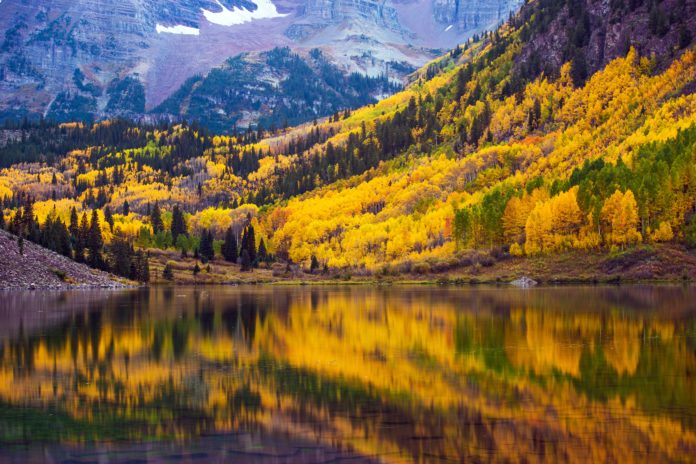Colorado lawmakers are one step closer to approving climate-change legislation that would set ambitious new targets for the state’s efforts to reduce greenhouse gas emissions — and help protect workers affected by the ongoing transition from fossil fuels to renewable energy.
On Friday, April 5, the House Energy and Environment Committee voted along party lines to advance House Bill 1261, legislation that would require Colorado to heed the warnings of the international scientific community and begin drastically cutting its carbon emissions in the coming years.
“Climate change is one of the major issues of our time,” said House Speaker KC Becker, a Democrat from Boulder and co-sponsor of the bill, during the committee hearing. “It’s imminent, and it’s very important that we address it very quickly. We don’t have a lot of time to reverse the impacts.”
Colorado has already warmed by about three degrees Fahrenheit due to human activity, said Kevin Trenberth, a climate scientist at the National Center for Atmospheric Research in Boulder, who testified in support of the bill. That warming has already led to increased drought and more frequent, intense wildfires throughout the state — trends that will only get worse as long as the world continues to emit carbon pollution into the atmosphere. At a certain point, Trenberth warned lawmakers, Colorado’s climate could reach a point of no return.
“All of a sudden you cross a threshold, and things break, things burn and people die,” he said.
The bill would set a series of targets for reducing statewide greenhouse gas emissions over the next three decades and direct state air-quality regulators to implement “cost-effective” rules to help achieve them. These new emissions goals would be roughly in line with what U.N. climate scientists say is necessary to avoid the worst effects of climate change: a 26 percent cut by 2025, a 50 percent cut by 2030, and a 90 percent cut by 2050.
Achieving such deep emissions cuts within the next eleven years, scientists at the U.N.’s Intergovernmental Panel on Climate Change wrote last year, would require “rapid, far-reaching and unprecedented changes in all aspects of society.” After leveling off for several years, global carbon emissions spiked again in 2017 and 2018, rising by more than 3 percent to another all-time high. Colorado’s emissions were projected to rise slightly between 2010 and 2020, according to a 2014 state estimate; an updated report is expected to be released in the first half of this year.
But with scientists’ warnings growing increasingly urgent and the harmful effects of warming already being felt in Colorado and around the world, climate activism is on the rise. Nearly a hundred people testified in support of HB 1261 at Friday’s hearing, from scientists and renewable-energy experts to winter-sports athletes and mothers worried about their children’s futures.
“The generation that’s going to deal with this issue more than anybody else is our kids,” says Jen Clanahan, an activist with the environmental group Colorado Moms Know Best. “We’re thrilled to see them introduce this bill to finally get serious about tackling this issue.”
“I have to do something about it so that I can face [my daughter] in the future,” she adds. “When she says, ‘What’s up with this drought and these terrible wildfires? What did you do to change this?’ I can look her in the eye and say I did everything I could.”
The few witnesses who testified in opposition to the bill included lobbyists for the Colorado Mining Association and the “Freedom to Drive Coalition,” a new group sponsored by auto dealers and trucking interests.
Also on Friday, Becker and Representative Rochelle Galindo introduced House Bill 1314, which would create a “Just Transition Office” in the Colorado Department of Labor and Employment. Beginning in 2025, the office would provide cash benefits to displaced workers in Colorado’s declining coal-mining industry and award grants for workforce training and other re-employment programs.
“The time to take action on climate is now, but we cannot work toward a clean-energy economy without also working on solutions to support workers who are affected by this transition,” said Becker in a statement announcing the bill. “Workers and communities whose livelihoods are threatened by shifting economic tides and advancements in technology need support.”
If approved by the House, both bills will need to move quickly through the Senate before the legislative session ends in early May. Although climate change is a global problem, activists have increasingly turned to state and local governments to make up for inaction and backsliding at the federal level — and for many Coloradans already feeling the impacts of warming, the stakes are high.
Beyond drought and wildfire risks, warmer temperatures are exacerbating the effects of air pollution from coal-fired power plants and oil and gas facilities along the Front Range. Mike Kingsbury, a Denver nurse who testified at Friday’s hearing, says he treats people dealing with the negative health effects of air pollution on a daily basis, and failing to act to stop climate change will only make them worse.
“Rising temperatures exacerbate everything from diabetes to lung disease to elderly people struggling with these things,” says Kingsbury. “Everybody can be affected by air quality, and vulnerable populations are obviously more at risk. It’s going to make people sicker. Climate change makes people sick.”







